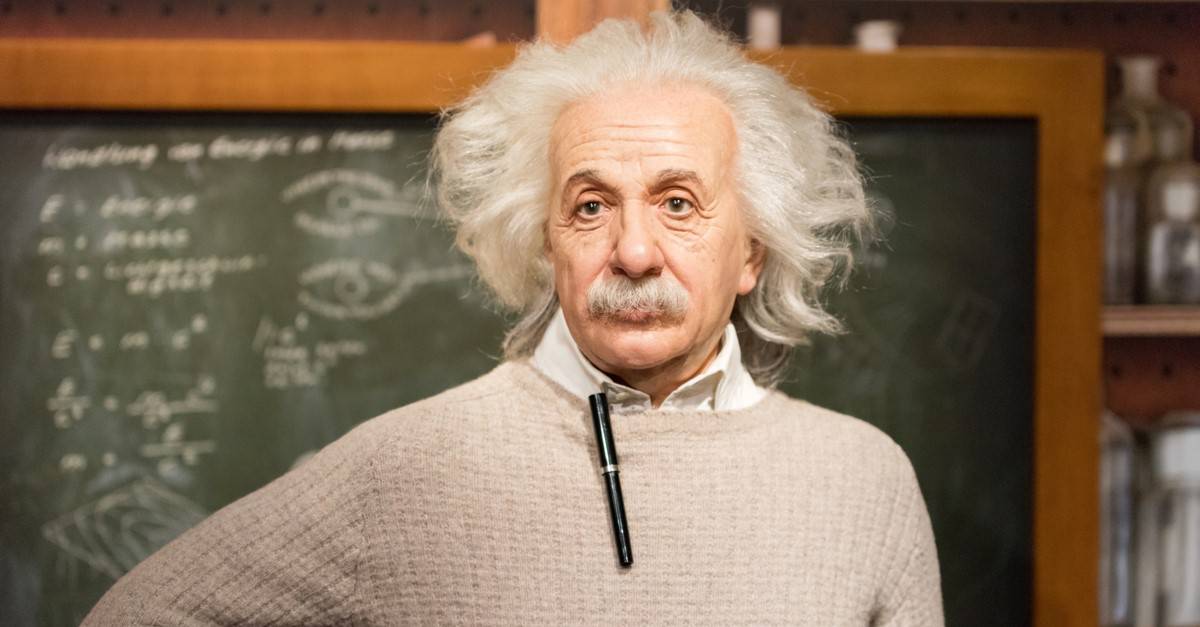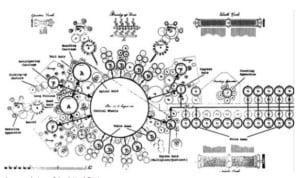When you hear the name “Albert Einstein,” what comes to mind? (Apart from that instantly recognizable photo of him with his tongue out.) The genius’s name has long been synonymous with intellectual prowess and disruptive contributions to the field of science. We know he’s smart, but exactly how smart? What was Albert Einstein’s IQ? And was he the smartest person ever to live? Let’s examine the man’s life and legacy to find out.
Albert Einstein’s IQ

©Allexxandar/Shutterstock.com
Albert Einstein’s IQ is estimated to have been around 160 or 165. Of course, it’s important to clarify that Einstein never actually took an IQ test himself. The IQ (Intelligence Quotient) is a measure of cognitive abilities relative to a person’s age. But, even though Einstein never personally took the assessment, experts can estimate such a high IQ for the man because of his remarkable contributions to the field of theoretical physics.
In other words, his world-changing theories on relativity and physics — not to mention his exceptional problem-solving skills — are the mark of a profound intelligence quotient. For reference, most people have an IQ somewhere between 80 and 110. Additionally, the average IQ is 100. Anything above an IQ of 130 is the mark of very superior intelligence. Experts presume Einstein would’ve cleared this marker with ease if he were to have taken an IQ test himself.
It’s not just that Einstein never took an IQ test. He couldn’t have taken a contemporary IQ test even if he wanted to. Intelligence Quotient assessments weren’t even popularized until after his death. Instead, his intellectual ability is measured by his number of scientific achievements and the sheer complexity of his work. Some bullish analysts have even tried to make the case that his IQ would’ve exceeded 200. Nevertheless, it seems more reasonable to place him in the 160s.
What Made Albert Einstein So Smart?

©metamorworks/Shutterstock.com
What is it about Albert Einstein that leads analysts to believe his IQ is in the 160s? As it turns out, there are a handful of reasons behind this estimated figure. From his strong sense of curiosity to his unique thought process to his invaluable contributions to his field, Einstein is more than deserving of this high IQ. Let’s elaborate on five of the traits that made Albert Einstein so smart.
1. Strong Sense of Curiosity
Albert Einstein had an insatiable curiosity about the scientific world around him. Much of his most important work began with big questions about why things worked the way they did. This curiosity fueled him to explore these heady subjects and eventually discover novel new ideas in the process.
2. Thinking Outside the Box
Beyond his curiosity, Einstein had the unique ability to think beyond the conventional boundaries of science at the time. He ventured into new territory time and time again, visualizing complex concepts and unanswered questions through intelligent thought experiments. His one-of-a-kind approach to problem-solving helped him explore ideas others might not have considered before.
3. Highly Motivated
For all his curiosity and his unique thought process, Einstein wouldn’t have been able to accomplish anything without the ability to immerse himself in his work for hours on end. The man had an amazing capacity for knowledge, able to concentrate deeply on a single problem far longer than any of his contemporaries could. This allowed him to uncover hidden insights and develop his iconic theories.
4. Critical Thinking Skills
Another key component of Einstein’s high IQ? His willingness to question the norm. If Albert Einstein didn’t have such strong critical thinking skills, he never would have challenged the conventional wisdom of his field or his predecessors. He didn’t accept things at face value, and it became a defining trait of his intelligence.
5. Unwavering Determination
Lastly, there was Einstein’s persistence through the many hardships and hurdles faced in his research. Albert Einstein never gave up on a problem, even when the going got tough. The man’s determination to solve the complex problems he faced gave him the resilience he needed to succeed in his field. Together, these five skills built Albert Einstein into the thinker he’s heralded as today.
Was Albert Einstein the Smartest Person Ever?

©iStock.com/peshkov
While Albert Einstein was undoubtedly an exceptionally intelligent individual, it’s hard to say whether he was the smartest person ever. While he unquestionably had an extraordinary amount of intelligence, we can’t know for certain what his IQ test results would have been. What’s more, the very concept of intelligence is not easily quantifiable and some might even call it subjective. How can you put a number or a figure on something that isn’t tangible?
Even so, Einstein’s brilliance is unquestionable. From his revolutionary theories to his imaginative thinking to his lasting legacy, there’s no doubt that the man transformed our understanding of the very universe we live in. However, granting the title of “smartest ever” would be a challenge for any individual, not just him. What about Isaac Newton? Leonardo da Vinci? Stephen Hawking? It’s tough to name just one person the smartest.
Nevertheless, Albert Einstein was undoubtedly a genius. His intelligence encompassed a wide range of skills and abilities, including creativity, innovation, critical thinking, and adaptability. His lasting legacy and his vital discoveries prove that he’s certainly one of the smartest people of all time, even if we don’t definitively name him the smartest person ever. Maybe it’s best to name him one contender of many.
The image featured at the top of this post is ©History-Computer.com/.







